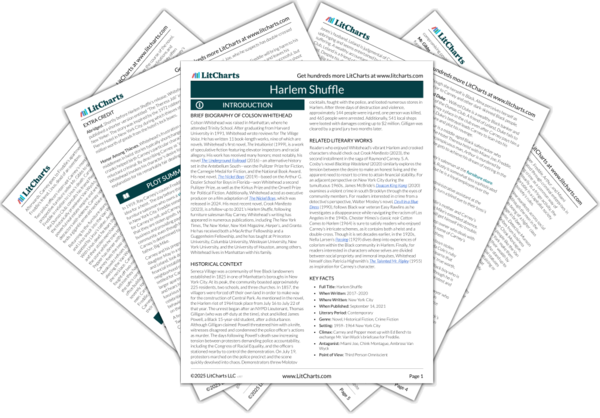Chink Montague Quotes in Harlem Shuffle
About a month later Carney received a package. He got an odd feeling and closed his office door and drew the blinds to the showroom. Inside the box, wrapped in newspaper like a fish, was Miss Lucinda Cole’s necklace. The ruby glared at him, a mean lizard eye. Pepper’s handwriting was childish. The note said, “You can split this with your cousin.” He didn’t. He sat on it for a year to let the heat die down. Buxbaum paid him and Carney put the money away for the apartment. “I may be broke sometimes, but I ain’t crooked,” he said to himself. Although, he had to admit, perhaps he was.
Five hundred dollars. Crooked world, straight world, same rules—everybody had a hand out for the envelope. A five-hundred-dollar investment in the future of Carney’s Furniture if business kept rolling in like it was. A second store, a third? The members of the Dumas Club circulated around him in the room: whiskey in hand, elbows in ribs. They were a collection of chumps, but he'd need these Dumas chumps for permits, loans, to keep the city off his back.
[…]
It was a betrayal of certain principles, sure, a philosophy about achieving success despite—and to spite—men like these. Condescending Leland types, Alexander Oakes and his lapdog buddies. But these were new times. The city is ever-changing, everything and everyone must keep up or fall behind. The Dumas Club had to adapt, and so did Carney.

Chink Montague Quotes in Harlem Shuffle
About a month later Carney received a package. He got an odd feeling and closed his office door and drew the blinds to the showroom. Inside the box, wrapped in newspaper like a fish, was Miss Lucinda Cole’s necklace. The ruby glared at him, a mean lizard eye. Pepper’s handwriting was childish. The note said, “You can split this with your cousin.” He didn’t. He sat on it for a year to let the heat die down. Buxbaum paid him and Carney put the money away for the apartment. “I may be broke sometimes, but I ain’t crooked,” he said to himself. Although, he had to admit, perhaps he was.
Five hundred dollars. Crooked world, straight world, same rules—everybody had a hand out for the envelope. A five-hundred-dollar investment in the future of Carney’s Furniture if business kept rolling in like it was. A second store, a third? The members of the Dumas Club circulated around him in the room: whiskey in hand, elbows in ribs. They were a collection of chumps, but he'd need these Dumas chumps for permits, loans, to keep the city off his back.
[…]
It was a betrayal of certain principles, sure, a philosophy about achieving success despite—and to spite—men like these. Condescending Leland types, Alexander Oakes and his lapdog buddies. But these were new times. The city is ever-changing, everything and everyone must keep up or fall behind. The Dumas Club had to adapt, and so did Carney.











